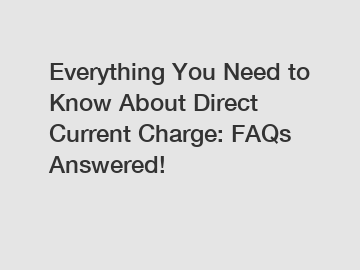Everything You Need to Know About Direct Current Charge: FAQs Answered!
Everything You Need to Know About Direct Current Charge: FAQs Answered!
Direct current (DC) charging is becoming increasingly popular as electric vehicles (EVs) gain traction in the automotive industry. However, many people still have questions about how DC charging works and what to expect. In this article, we will answer some frequently asked questions about DC charging to help you better understand this technology.
What is Direct Current (DC) Charging?

Direct current charging is a method of charging electric vehicles by providing electrical current in a single direction. This type of charging is typically faster than alternating current (AC) charging, making it ideal for drivers on the go who need a quick recharge.
How does DC Charging Work?
DC charging works by converting AC power from the grid into DC power that can be used to charge an electric vehicle's battery. This conversion process is done by the charging station itself, which then transfers the DC power directly to the vehicle's battery.
What are the Benefits of DC Charging?
One of the main benefits of DC charging is its speed. DC chargers can provide a full charge in a fraction of the time it takes for an AC charger to do the same. This makes DC charging ideal for long road trips or quick stops during your daily commute.
Another benefit of DC charging is its efficiency. Because the electricity is converted directly to DC power, there is less energy lost in the charging process compared to AC charging. This means that you can get more miles of range for the same amount of electricity used.
Are there Different Types of DC Chargers?
Yes, there are different types of DC chargers, including CHAdeMO, CCS (Combined Charging System), and Tesla Superchargers. Each type of charger is compatible with specific types of electric vehicles, so it is important to know which charger your EV can use before choosing a charging station.
Where can I Find DC Charging Stations?
DC charging stations are becoming more common at public places such as shopping centers, rest areas, and gas stations. You can also find them at dedicated EV charging stations and some workplaces. Many electric vehicles also come with built-in navigation systems that can help you locate nearby charging stations.
How Much Does DC Charging Cost?
The cost of DC charging can vary depending on the location and the charging station provider. Some stations offer free charging, while others may charge a fee based on the amount of electricity used or a flat rate per session. It's important to check the pricing before you start charging to avoid any surprises.
Is DC Charging Safe for my Electric Vehicle?
DC charging is safe for electric vehicles when used properly. Charging stations are designed to meet industry standards for safety and reliability, so you can rest assured that your vehicle will be in good hands while charging. Just be sure to follow any instructions provided by the charging station to ensure a safe and efficient charging experience.
Conclusion.
In conclusion, DC charging is a fast and efficient way to recharge your electric vehicle while on the go. With the increasing availability of DC charging stations, electric vehicle owners can enjoy the convenience of quick charging wherever they go. If you have any more questions about DC charging, feel free to reach out to us for more information.
Contact Us.
If you have any more questions about DC charging or need assistance finding a charging station near you, please do not hesitate to contact us. We are here to help you with all of your electric vehicle charging needs.
Are you interested in learning more about Smart Home Wallbox, 7kw Home Charger, Ac Ev Charger? Contact us today to secure an expert consultation!


